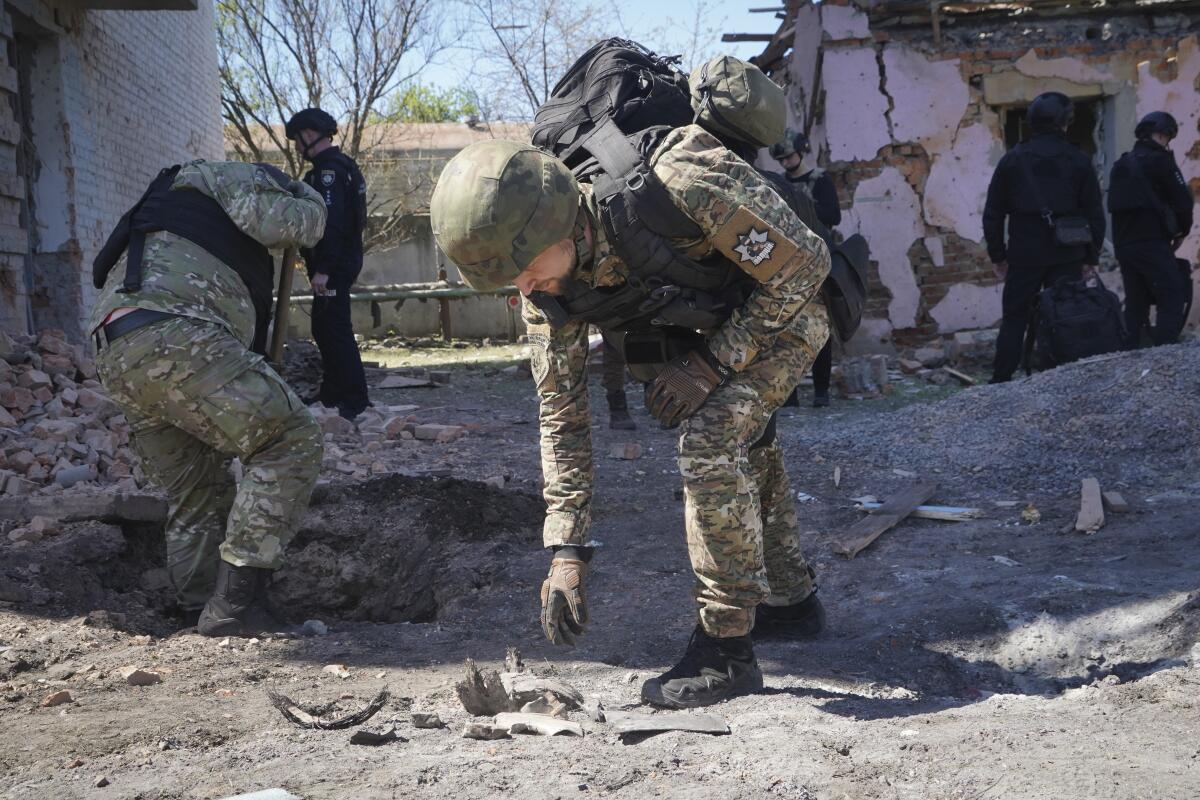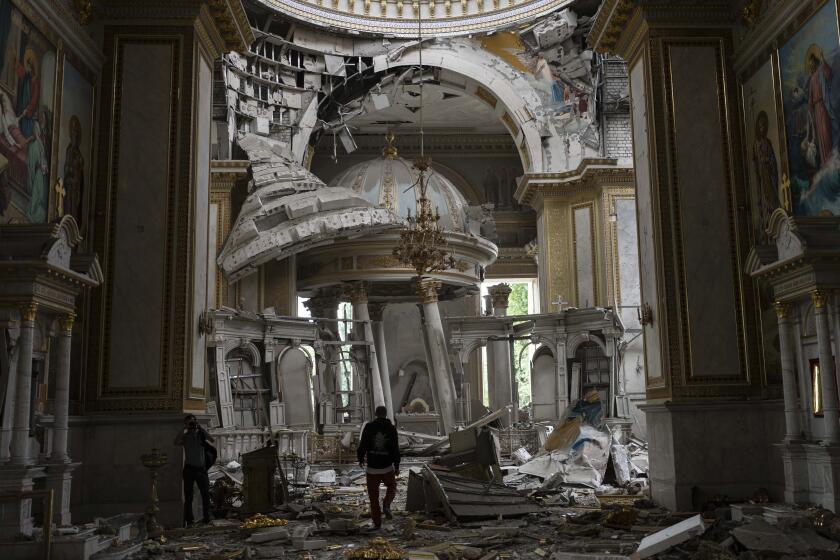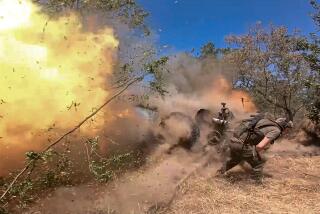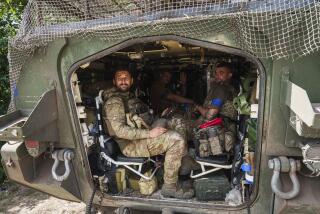Russia tries to breach Ukraine’s defenses in the Kharkiv region

The assault began at dawn. Defenders rushed in reinforcements. Pitched fighting raged.
Ukraine and its allies sought Friday to discern whether Russian forces were opening a major new war front, more than two years after Moscow’s full-scale invasion of its sovereign neighbor.
“There is a fierce battle,” Ukrainian President Volodymyr Zelensky told reporters in the capital, Kyiv, hours after Russian troops launched an armored ground offensive in northeastern Ukraine, near the country’s second-largest city, Kharkiv.
Ukraine’s defense ministry said its forces had blunted an initial Russian attempt to break through Ukrainian lines outside the border town of Vovchansk, but that fighting of varying intensity continued in the area.
Military analysts said the attack came as no real surprise, but it was not yet clear whether this was a feint to divert overstretched Ukrainian forces or marked the start of a serious all-out assault.
“It’s potentially very dangerous,” said Marc Thys, a former Belgian deputy defense chief who is now a senior analyst at the Brussels-based Egmont Institute. “It’s also very difficult to analyze at this moment.”
Amid worsening Ukraine war outlook, an infusion of American military aid is seen as crucial in the fight against Russian invaders. Will it be enough?
Ukraine for months has been struggling on the battlefield, with the most aggressive Russian moves concentrated on a different sector of the long front lines. The eastern town of Chasiv Yar — more than 160 miles to the southeast of Friday’s fighting and a key bulwark against a Russian push deeper into the Donbas industrial region — has been menaced for weeks.
But Ukraine’s northeast is vulnerable as well. Ukraine said earlier this year Russia was massing troops on its side of the frontier, where they could be used to strike at Ukraine’s Kharkiv and Sumy provinces.
Russian President Vladimir Putin has said Moscow wants to create a buffer zone inside Ukraine, which the Kremlin depicts as a necessary defensive measure — a position Ukraine calls ludicrous since Russia started the war and could end it by pulling back its forces.
“Ukrainian officials have been anticipating an attack on Kharkiv/Sumy for some time,” analyst Dara Massicot of the Carnegie Endowment for International Peace wrote on the social media platform X. However, she said, an offensive could divert reserves that Russia wants to use for what she described as its main objectives in the east of Ukraine.
As always in such an outbreak, civilians suffered. Before Friday’s ground assault began about 5 a.m., Russian forces had hit Vovchansk with intense artillery shelling and aerial guided bombs overnight, said Oleh Sinegubov, the regional governor.
At least two civilians were reported killed and several others wounded, setting off an evacuation order affecting about 3,000 people. Fighting has already depleted the town of much of its prewar population of about 17,000.
Kharkiv, Ukraine’s second-largest city, is facing intense Russian airstrikes, but its residents are defiant. “We can stand up, no matter what they do,” one said.
The attack posed little immediate danger to the city of Kharkiv, home to some 1.3 million people and 25 miles from the Russian frontier. Russia tried early in the war to seize Kharkiv, symbolically important to it as the first capital of Ukraine back in its days as a Soviet republic, but analysts say capturing and holding it would require far more forces than Moscow has at its disposal.
Since the start of the year, the city has been subjected to punishing bombardment, and analysts have said Russia could seek to blockade it even if it did not make a move against Kharkiv itself.
Ukraine’s Defense Ministry said reserve units had been deployed to counter the Russian ground attack, a move that could also complicate efforts to bolster Ukrainian defense elsewhere along the battlefront.
Delays in the provision of U.S. and European aid have raised fears of a concerted Russian offensive this spring, although weather conditions for that are likely to be more favorable a few weeks from now.
More American weaponry is on the way after last month’s long-blocked congressional approval of $61 billion in military assistance. And on Friday, the Biden administration announced a new $400-million aid package that allows for weapons including armored vehicles and rockets to be drawn from existing Pentagon stockpiles and quickly deployed to the battlefield.
Could Ukraine lose the war? Once nearly taboo, the question hovers in Kyiv, but Ukrainians believe they must fight for their lives against Putin’s troops.
Even so, some analysts said the delay had allowed Russian forces to gain crucial momentum — and that Russian forays like this one might be meant to hit Ukrainian positions hard before more Western help arrives.
Territorial losses in the Kharkiv region would be a particularly bitter pill for Ukraine to swallow, after a stunningly successful Ukrainian military push there in the fall of 2022. That counteroffensive was an enormous morale boost for Ukraine and helped convince Western allies that the Kyiv government’s fight might be a winnable one.
Even as its outgunned and outnumbered troops have struggled on the front lines, Ukraine has seemingly rattled the Kremlin with a campaign of increasingly long-range drone strikes inside Russian territory. Most have taken aim at energy installations, including one Friday on a refinery near Kaluga, southwest of Moscow.
Ukraine’s port of Odesa is a key Russian target, endangering the city’s UNESCO-designated historic center and challenging citizens to keep their sense of humor.
A day earlier, Ukraine made what appeared to have been its deepest strike inside Russia, one that reportedly hit a petrochemical facility some 800 miles from the border with Ukraine. Ukrainian military intelligence declined to comment on the attack.
Some Ukrainian officials played down the significance of the Russian attempt to advance on Vovchansk, which it had occupied earlier in the war.
Sinegubov, the Kharkiv regional governor, told Ukrainian television that the attacks were primarily probing in nature, to “test the positions of our military.” Ukrainian analyst Taras Berezovets, writing on the messaging app Telegram, called the Russian forces “sufficient only for provocations” in the northeast.
But some Western analysts, including Thys, said the Russian move posed genuine peril — if it can be sustained.
“It all depends on reserve forces, what Russia can expend,” he said.
More to Read
Sign up for Essential California
The most important California stories and recommendations in your inbox every morning.
You may occasionally receive promotional content from the Los Angeles Times.














